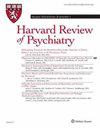COVID-19住院患者的精神状态改变:来自神经病学和精神病学顾问的观点
IF 2.5
4区 医学
Q2 PSYCHIATRY
引用次数: 0
摘要
本文章由计算机程序翻译,如有差异,请以英文原文为准。
Altered Mental Status in Patients Hospitalized with COVID-19: Perspectives from Neurologic and Psychiatric Consultants.
History of Present Illness A 62-year-old man with a past medical history of asthma and opioid use disorder on methadone developed respiratory symptoms in mid-March, which progressed to subacute respiratory failure by early April. He was diagnosed with COVID-19 by nasopharyngeal RT-PCR and admitted to an academic New York City hospital. The patient was intubated for hypoxemia, sedated with propofol and fentanyl, and admitted to themedical intensive care unit (MICU). Laboratory testing revealed elevated serum levels of D-dimer at 1143 ng/mL (reference level <500 ng/mL), C-reactive protein at 73.70 mg/L (reference level <8 mg/L), and ferritin at 554 ng/mL, together reflecting a pattern of elevated inflammatory markers associated with severe COVID-19 infection. The patient’s prolonged hospital course was complicated by numerous infections, including methicillin-resistant Staphylococcus aureus bacteremia (hospital day 8), vancomycinresistant Enterococus bacteremia (hospital day 13), multidrugresistant Enterobacter pneumonia (hospital day 14), and a Pseudomonas-positive urinary tract infection (hospital day 17), all of which were treated with multiple courses of antibiotics. Attempts to wean sedation and ventilatory support were complicated by the above infections and,when sedationwasweaned, by ventilator dyssynchrony and agitation, resulting in the uptitration of propofol and maintenance on mechanical ventilation. Because of a need for prolonged respiratory support, the patient required tracheostomy on hospital day 10. By hospital day 14, the patient had developed acute kidney injury with creatinine elevated to 2.1 mg/dL, from a baseline 0.8 mg/dL at time of admission.
求助全文
通过发布文献求助,成功后即可免费获取论文全文。
去求助
来源期刊

Harvard Review of Psychiatry
PSYCHIATRY-
CiteScore
7.50
自引率
0.00%
发文量
67
审稿时长
>12 weeks
期刊介绍:
The Harvard Review of Psychiatry is the authoritative source for scholarly reviews and perspectives on important topics in psychiatry. Founded by the Harvard Medical School''s Department of Psychiatry, the Harvard Review of Psychiatry features review papers that summarize and synthesize the key literature in a scholarly and clinically relevant manner. Topics covered include: Schizophrenia and related disorders; Mood disorders; Personality disorders; Substance use disorders; Anxiety; Neuroscience; Psychosocial aspects of psychiatry; Ethics; Psychiatric education; and much more.
In addition, a Clinical Challenges section presents a case with discussion from a panel of experts. Brief reviews are presented in topic-specific columns that include Cross-Cultural Psychiatry, History of Psychiatry, Ethics, and others.
 求助内容:
求助内容: 应助结果提醒方式:
应助结果提醒方式:


